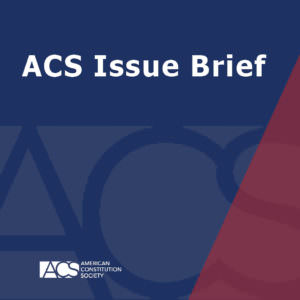Revisiting Judicial Activism: The Right and Wrong Kinds
Lerner Family Associate Dean for Public Interest and Public Service Law; Professorial Lecturer in Law, George Washington University Law School

ACS is pleased to distribute “Revisiting Judicial Activism: The Right and Wrong Kinds” by Alan B. Morrison, Lerner Family Associate Dean for Public Interest and Public Service at The George Washington University Law School. In his Issue Brief, Professor Morrison defines judicial activism as “judicial decision-making that overturns legislative or executive judgments” and reasons that the operative question regarding judicial activism is not whether such activism is “good or bad,” but whether it can be deemed “legitimate” in specific cases. Answering this question, Professor Morrison contends that “it is most appropriate for the [Supreme] Court to intervene and overturn legislative decisions when there is some reason to believe that our system of representative government has not worked and that the protections that the Constitution is supposed to afford are lacking. The most common circumstance of appropriate intervention is to safeguard rights of a racial or other minority that were not adequately represented in the political process."
Three full terms of the Supreme Court have concluded since Professor Morrison initially articulated this theory of appropriate judicial activism in an earlier ACS Issue Brief. Applying the theory to the Court’s recent decisions regarding the constitutionality of the Affordable Care Act, the Voting Rights Act , the Defense of Marriage Act, and California’s Proposition 8, Morrison demonstrates that his “approach still holds.”
Read full issue brief here: Revisiting Judicial Activism: The Right and Wrong Kinds
